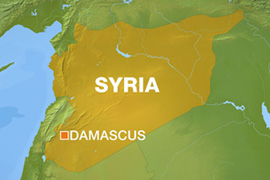Several killed in Damascus bombing
Investigation under way after southern suburb of Syrian capital is rocked by powerful car bomb explosion.

The area is a densely populated area of Damascus, he said.
Security forces have sealed off the site of the blast and an investigation has been launched by counter-terrorism officers, he said.
No group or individual has so far claimed responsibility for the attack.
 |
Bassam Abdul-Majid, Syria’s interior minister, said that the bombing was a “terrorist act”, but declined to say who was suspected of involvement in the aatack.
“We cannot accuse any party,” he told state television.
“There are ongoing investigations that will lead us to those who carried it out.”
Ziad Haider, a freelance journalist in Damascus, told Al Jazeera that it is still not certain what the motive was for the attack.
“The security post [near to where the bomb detonated] is not a very important or significant security site; it is for petrol for security patrols,” he said.
“It is very near the Saydah Zeinab shrine. At this time of year during Ramadan, it is very significant. Pilgrims come from Lebanon, Iraq and Iran to visit the shrine.
“The security post has not been harmed. The explosion took place quite a way from it. Either the [attack] has not been planned very well, the bombs went off before they reached the site, or there was another target we do not know of.”
The bombing is the first in the Syrian capital since February, when Imad Moghaniyah, the senior military commander of Lebanese Shia Muslim group Hezbollah, was killed by a car bomb.
Israel was blamed for the attack on Moghaniyah by Damascus and Hezbollah, which has close ties to Syria, but Tel Aviv denies involvement.
Syria-Hezbollah ties
Saturday’s atttack comes days after authorities from Lebanon said that Syria had sent security forces to the international border between the two neighbours.
Damascus said the deployment was made for internal security reasons.
In August, Syria said that Mohamed Sleiman, a senior Syrian general, had been assassinated.
He was often described by the Arab media as the Syrian government’s liaison officer with Hezbollah.
Syria has been accused by the US of providing logistical support to Hezbollah, particularly after Damascus pulled its troops and security apparatus out of Lebanon in April 2005.
The redeployment of Syrian forces from Lebanon followed massive anti-Syrian protests in Lebanon in the wake of the assassination of Rafiq al-Hariri, a former Lebanese prime minister.
A series of other attacks in Syria in recent years have been blamed on Sunni Muslim fighters opposed to the country’s secular government.